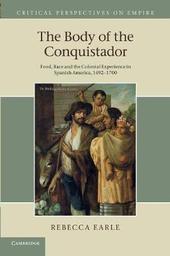
|
The Body of the Conquistador: Food, Race and the Colonial Experience in Spanish America, 1492-1700
Paperback / softback
Main Details
| Title |
The Body of the Conquistador: Food, Race and the Colonial Experience in Spanish America, 1492-1700
|
| Authors and Contributors |
By (author) Rebecca Earle
|
| Series | Critical Perspectives on Empire |
|---|
| Physical Properties |
| Format:Paperback / softback | | Pages:278 | | Dimensions(mm): Height 229,Width 152 |
|
| Category/Genre | Colonialism and imperialism |
|---|
| ISBN/Barcode |
9781107693296
|
| Classifications | Dewey:980.013 |
|---|
| Audience | | Professional & Vocational | | Tertiary Education (US: College) | |
|---|
| Illustrations |
20 Halftones, unspecified; 1 Line drawings, unspecified
|
|
Publishing Details |
| Publisher |
Cambridge University Press
|
| Imprint |
Cambridge University Press
|
| Publication Date |
20 February 2014 |
| Publication Country |
United Kingdom
|
Description
This fascinating history explores the dynamic relationship between overseas colonisation and the bodily experience of eating. It reveals the importance of food to the colonial project in Spanish America and reconceptualises the role of European colonial expansion in shaping the emergence of ideas of race during the Age of Discovery. Rebecca Earle shows that anxieties about food were fundamental to Spanish understandings of the new environment they inhabited and their interactions with the native populations of the New World. Settlers wondered whether Europeans could eat New World food, whether Indians could eat European food and what would happen to each if they did. By taking seriously their ideas about food we gain a richer understanding of how settlers understood the physical experience of colonialism and of how they thought about one of the central features of the colonial project. The result is simultaneously a history of food, colonialism and race.
Author Biography
Rebecca Earle is Professor of History at the University of Warwick. Her previous publications include The Return of the Native: Indians and Mythmaking in Spanish America, 1810-1930 (2008).
Reviews'With its focus on food and corporeal well-being, [this book] opens a fascinating new chapter in Spain's conquest and colonization of the Americas. What were Spaniards to eat as they encountered unfamiliar foodstuffs ... that reportedly did irreparable damage to both body and mind? As for the natives, was their stature and temperament connected to 'the poor quality of the food they eat'? ... As Earle explains in this new important study, these and related questions sparked lively debate on both sides of the Atlantic. Stunningly original and deeply researched, her book is not to be missed. It is essential reading for both the history of the Americas and early modern ideas about the relationship between food, culture, bodies, and health.' Richard L. Kagan, Arthur O. Lovejoy Professor of History, The Johns Hopkins University 'This book is a highly original study that uses a new and very fruitful methodological approach. Earle's research is superb and far- ranging. This is certainly a study that specialists of the colonial world, food history, and race should read.' Hispanic American Historical Review 'Clearly written and based on impressive primary and secondary research, Earle's book belongs in every academic and large public library. Essential.' Choice 'With this well-researched, erudite, and nuanced work, Earle has fundamentally shifted discussions of the colonial body, environmental history and the colonial enterprise itself ... This fine book deserves a place on every Hispanist's bookshelf and will serve admirably in seminars on colonial Latin American and environmental history.' Jacqueline Holler, Journal of Colonialism and Colonial History
|